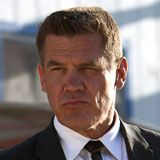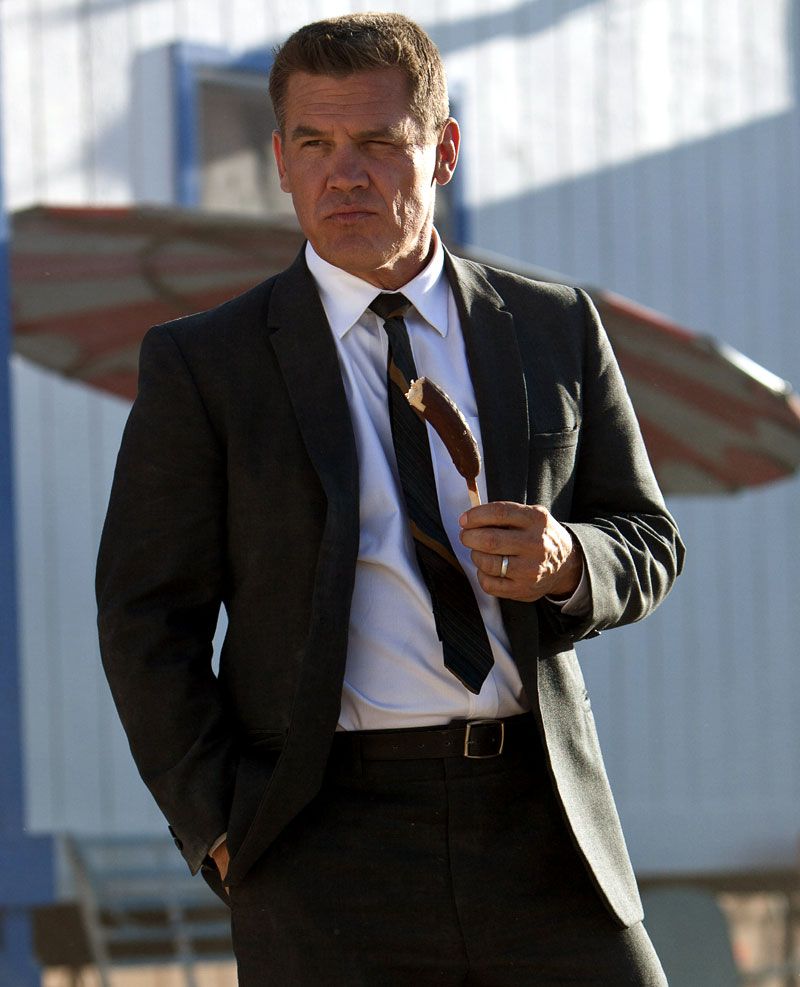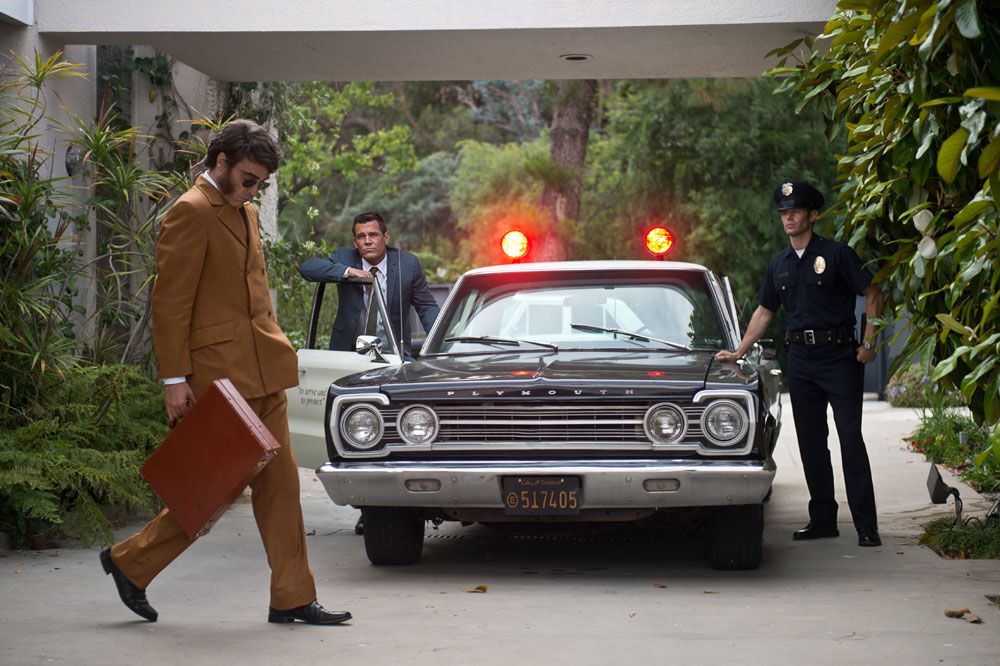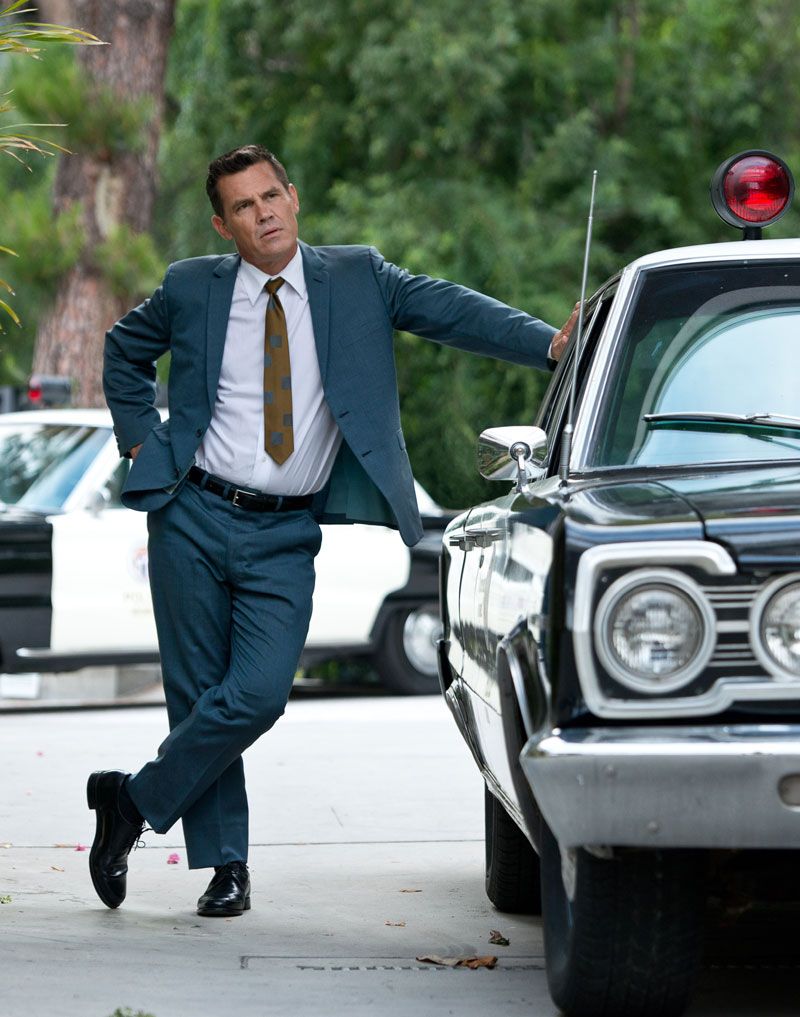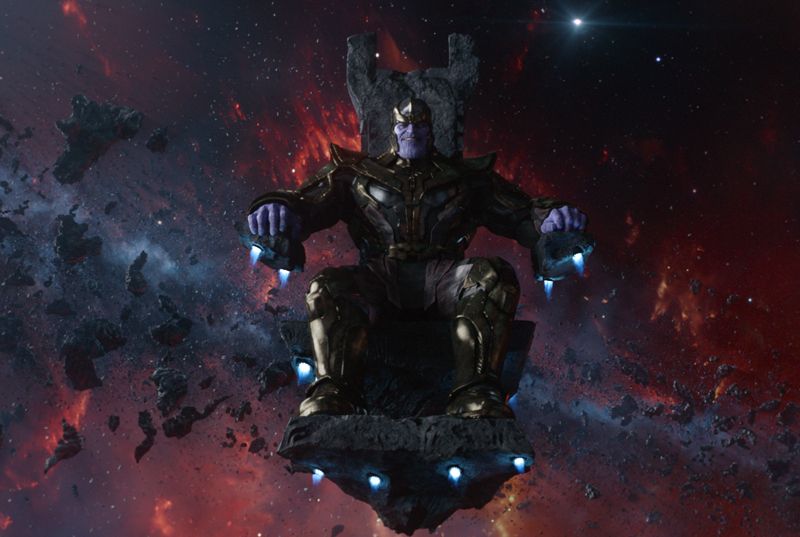Josh Brolin heated up the green screen this year with roles in the effects-heavy films Guardians of the Galaxy and Sin City: A Dame to Kill For, but if you needed a reminder that the Oscar nominee can bring the pyrotechnics on his own, look no further than Inherent Vice.
Brolin teams with acclaimed filmmaker Paul Thomas Anderson for the adaptation of Thomas Pynchon's 2009 novel, which drops stoned, hippie L.A. private eye Doc Portello (Joaquin Phoenix) into a labyrinthine, Chandler-esque pot set against the uneasy cultural transition from the free-loving ‘60s into the more troubled ‘70s. As the volatile detective/wannabe actor Bigfoot Bjornson, Brolin delivers another searing performance with a twist: His would-be hero cop isn't as smart as he needs to be to prevail.
Spinoff joined Brolin for a roundtable discussion about his latest effort, as well as his feelings about taking on the role of Thanos in the Marvel Cinematic Universe.
On his experience working with Paul Thomas Anderson:
Josh Brolin: Great – I mean, better than great, just because he’s a guy who creates an ambiance of possibility. So you choose a story like this: First of all, when you see There Will Be Blood, or you see raining frogs in Magnolia, you’re like, “OK, he’s willing to kind of go into a different place.” He has a perspective that I think is interesting, personally. It has nothing to do with how successful is he, or how this or how that. It’s just "Is it a fun theater piece to do? Who else is doing it? Joaquin? OK. Well, that’s a given." So why would you not do it? And then you get involved. And I knew him through the awards circuit when we were doing No Country [For Old Men]; he had There Will Be Blood. So I knew him a little bit – but I knew him with Daniel [Day-Lewis], and it was a little untouchable. It’s like this guy works with the greatest actors out there, and that’s it.
Even seeing The Master, I just thought it was amazing. Especially more times – when I saw it the second time and the third time I thought it got better and better and better for me. So in my mind, whatever that is and wherever I perceive myself at the moment, it’s not like "Oh, I’d really like to work with Paul Thomas Anderson." It’s just like that’s probably something that’s not going to happen. And then you get a call saying, “Look, I think I may have some work for you,” which was the line! Paul said that to me.
And then it works out. And then you’re on set with this guy, and he’s like your brother. And I don’t mean your bro, I mean actually like your brother. And you’re like, "Oh, we grew up together. We understand the same things. We have the same references. We appreciate a lot of the same absurdities. And we see the humanity in those absurdities. Cool. All right, so what do we do? Let’s try this, let’s try that."
Even though I’m there to see his vision through – it reminds me of the Coen brothers working together – there’s never an argument. There’s misunderstandings, differences of opinion, but never any like, “Why? What do you want to do that for?” It was like, “Let’s go here." "Great." "What about this?" Great.”
On the prep work he did on the character prior to shooting:
Just [read] the book, man. I wasn’t familiar with Pynchon. But I was very lucky because being around people like Roscoe Lee Browne and Anthony Zerbe and all that, where I got to hear really amazing actors who understand literature and dialogue and poetry, and not in that froufrou kind of lame way. In a way that’s really kind of guttural and cellular and appreciative, so I got to hear them for the last 25 years. So that helped a lot. And then you read Pynchon, and Pynchon is so dense and all this, and you go," I just got it." I just was like, "I think I know how to humanize this, and not just make it a jokey kind of like 'Whoa, what a bong hit.'"
On his character's resistance to the generational, cultural changes occurring around him:
He’s not only a generation behind – he’s like a generation and three-quarters behind. Because he refuses to let go of that Right Stuff image he has of himself and how life should be. And yet he’s not intelligent enough or impactful enough to understand you have to be valuable with the times. And you’ll actually get more out of Doc by getting rid of all that kind of racist or civil rights violating, you know what I mean? And quit being such an idea of yourself.
He’s a kid having a tantrum. He wants his Froot Loops, and he’s not getting his Froot Loops and he doesn’t know how [to deal with it]. He doesn’t understand that the tantrum’s not working. And he gets more frustrated because the tantrum’s not working instead of being smart enough to go, “If I maybe am really nice, maybe that will work. Next time at the grocery store.” But he doesn’t get that.
On whether he and Joaquin Phoenix could have swapped roles:
Totally. It would be like our Othello. I would do it again in a second flipped. Oh, my God, it’d be great. And especially, like, [Joaquin as] Bigfoot – it would be awesome. I never thought of that. That’d be amazing, actually. I would love to do something like that. There’s certain people that you work with who are really like gracious and amazing and electric and emotionally electric. He’s that. I like that. Some people don’t. I know actors that hate improvising – not that we improvised a lot in this: I think we emotionally improvised, behaviorally improvised. But some people don’t like that.
Plus, by the way, I like to learn a script before I start. I know the whole script before I start the movie. But knowing that Paul may rewrite this and that. But I know the foundation. I don’t feel like I can work on what I want to do unless I know the whole thing. Where other actors may come in and they know the character, they just don’t know the dialogue. So they’ll peek at the dialogue before, and they like it to be elusive. Because it’s more human to them. They’re stretching for it and they’re reaching for it. I hate that. I hate that. I want to know that I have the foundation. And then I can go off on a tangent if I want. I always have that foundation to go back to. So it’s just different strokes for different folks.
On whether he's encountered real-life, fame-hungry and frustrated Angelenos like Bigfoot:
I have, I have. I’ve met a lot of actors like that. Who want to be something and they’re frustrated that they’re not. I was very lucky. I never went through that because I was never bitter about where I wasn’t. I was always appreciative of great performances even if they were people that were peers of mine. But yeah, but not to that extreme. I met cops. I also met the opposite: I had a mother who was pretty extreme in every way. She had a cop called “Blackie” who pulled her over and when he gave her the ticket to sign for it, my mom took the book and threw it out in the middle of the freeway. And then he stopped traffic, very calmly stopped traffic, picked up the book and brought it back to her, then had her re-sign it. And they became friends for like 20 years. So that’s the opposite. So I always thought of Blackie during this time, doing this role. Because anything Blackie would do, they'd would do the opposite. But yeah, I’ve met people like that.
On how his and Phoenix's contrasting acting approaches gelled:
They gelled really, really well. I think the approaches are very different. I need objectivity. That’s for me, personally. I need to be able to – like, when you do dramatic things a lot, for me, I fuck around a lot. Trying to crack everybody up with whatever I’m doing. Because when I get into the scene, then it's unfamiliar to me, and that’s good. Do you know what I mean? If I’m in it all the time, I’m bored by the time I get there. That’s just me. There’s no judgment to it. There used to be judgment. Like, “Aren’t I supposed to be the guy in the corner, like, ‘Oh, my God …'” Have some lady that I hired to yell at me all the time or something, I don’t know. But Joaquin’s in it, all the time. That’s what works for him.
And, like, Sean [Penn] and I in Milk, we work very, very similarly together. We worked very similarly. We pace a lot. I pace a lot. Then so you have your mark right there, so not until right before “Action” do I ever hit my mark. Because that’s that moment of like transitioning from whatever I was doing to that. And then, so Sean and I would go like this [uses his fingers to illustrate two people circling away from each other], and then we’d go, “And, action.” But Joaquin and I were a little bit different. And it was like – it was just different. Wasn’t opposite, at all. Because when we were in it, we were very similarly convicted. Total conviction once you’re doing it. And then whatever you’re doing otherwise is none of my business.
On his reasons for taking on the role of Thanos for the Marvel Cinematic Universe:
It’s just different, man. It’s just different. I don’t have a thing, like, “I only do smaller films. I always do this.” Or, “I want to do that.” It’s just like, I read a story and I go, “Wow. That’s cool.” Not, “I want to get into this genre, I want to get into that genre.” So Thanos came along, and I had a good friend, Louis D’Esposito, who was a first A.D., who is now the co-president of Marvel, and he and I used to trade together – we did Hollow Man together. He called me and we just started talking about this thing. And it was nice, because I could intimately talk to him about it: what I liked, what I didn’t like about the whole idea of it. But I loved the idea of Thanos. Ultimately, it’s Thanos against everyone. So why wouldn’t you do that? I don’t know – It’s a strange thing. I was more nervous doing that than I think I’ve been for a long time. I was in front of 32 little cameras and I had a face spray-painted with like iridescent paint and all that. So it was very different. But I like it. It’s fun. It’s different.
When I saw what they did, that was exciting. Even though it was only – what, a minute, two minutes or something? Not even that. It was really exciting and the possibilities of what it could become. Not as an idea, not as a blockbuster, but as just something different. It’s a character mentality. That’s just a different character. It’s fun. It’s all fun, man.
Inherent Vice opens Friday in select theaters, and Jan. 9 nationwide.

